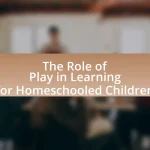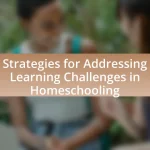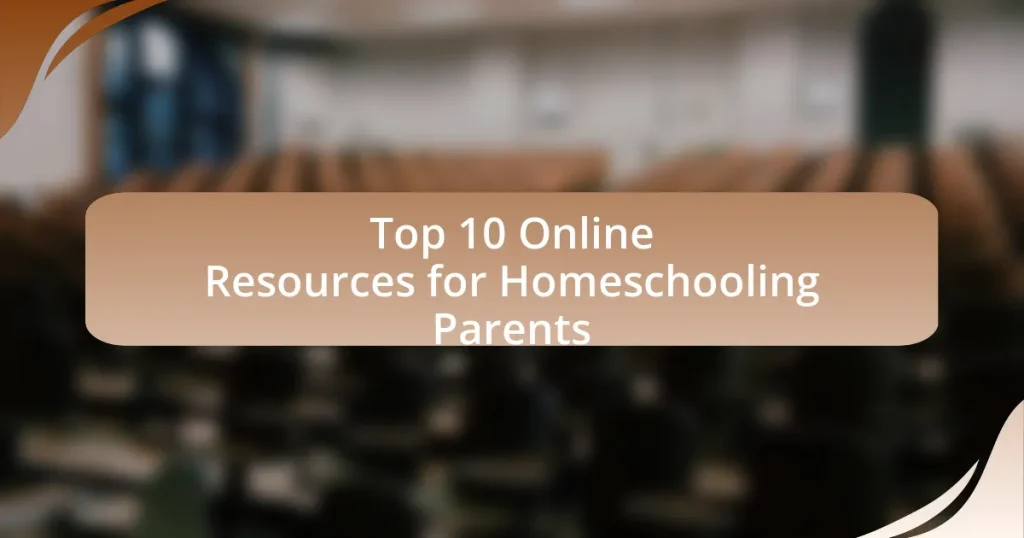The article focuses on the top 10 online resources for homeschooling parents, highlighting platforms such as Khan Academy, Coursera, and Homeschool.com, which provide valuable educational materials and support. It discusses how these resources enhance the homeschooling experience by offering structured curricula, interactive learning tools, and access to diverse subjects. Additionally, the article outlines the types of educational materials available, the importance of catering to different learning styles, and strategies for effectively integrating these resources into a homeschooling routine. It also addresses common challenges and best practices for selecting and utilizing online resources to maximize educational outcomes.
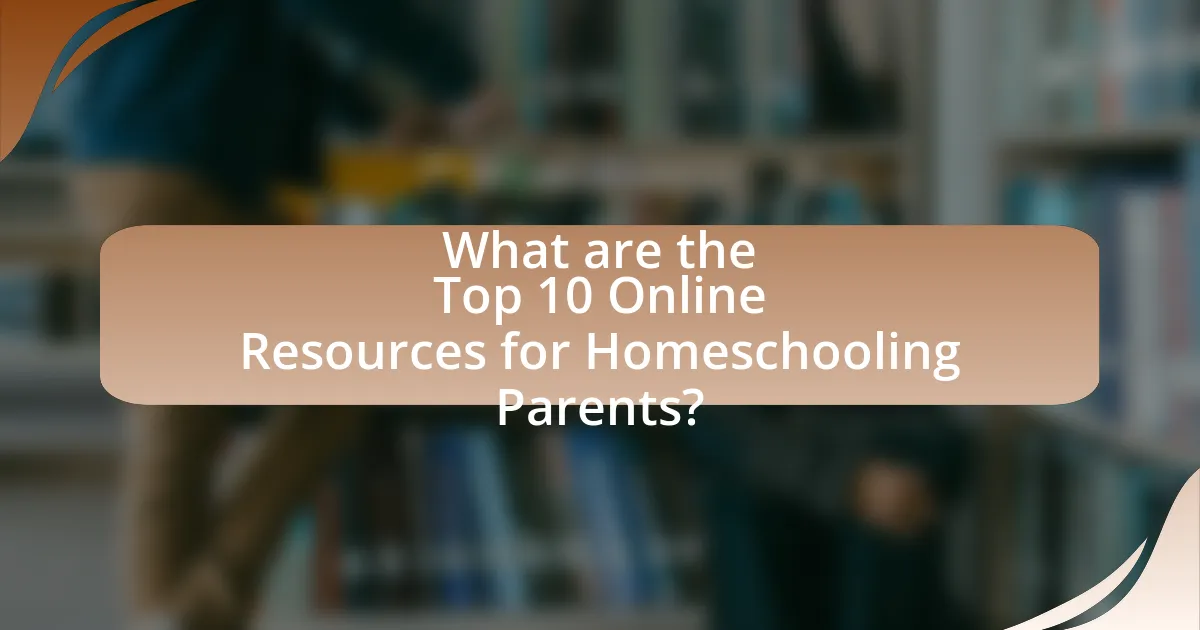
What are the Top 10 Online Resources for Homeschooling Parents?
The top 10 online resources for homeschooling parents are:
- Khan Academy – Offers free online courses, lessons, and practice in various subjects.
- Coursera – Provides access to courses from universities and organizations worldwide.
- Homeschool.com – A comprehensive resource for homeschooling information, curriculum reviews, and support.
- Time4Learning – An online curriculum for preschool through high school, featuring interactive lessons.
- National Geographic Kids – Offers educational resources and activities focused on geography and science.
- PBS LearningMedia – Provides free educational resources and lesson plans for teachers and parents.
- Edmodo – A platform for educators to share resources and connect with students and parents.
- Scholastic Learn at Home – Offers daily learning activities for children from pre-K to grade 9.
- Outschool – Connects students with live online classes on various subjects taught by independent teachers.
- The Homeschool Mom – A resource for homeschooling families, featuring articles, curriculum reviews, and support groups.
These resources are widely recognized for their educational value and support for homeschooling families.
How can these resources enhance the homeschooling experience?
These resources can enhance the homeschooling experience by providing structured curricula, interactive learning tools, and access to a wide range of subjects. For instance, platforms like Khan Academy offer comprehensive lessons and exercises that cater to various learning styles, which can improve student engagement and understanding. Additionally, resources such as online forums and communities allow homeschooling parents to connect, share experiences, and access support, fostering a collaborative learning environment. Research indicates that structured resources can lead to improved educational outcomes, as they help parents effectively manage their teaching efforts and provide diverse learning opportunities.
What types of educational materials do these resources provide?
These resources provide a variety of educational materials, including lesson plans, worksheets, interactive activities, video tutorials, and assessments. For instance, platforms like Khan Academy offer comprehensive video lessons and practice exercises across multiple subjects, while Teachers Pay Teachers provides downloadable resources created by educators, such as customizable worksheets and lesson plans. Additionally, websites like PBS LearningMedia offer multimedia resources that include videos and interactive games tailored to different grade levels and subjects, enhancing the learning experience for homeschooling parents and their children.
How do these resources cater to different learning styles?
These resources cater to different learning styles by offering a variety of formats and approaches tailored to individual preferences. For instance, visual learners benefit from video tutorials and infographics, while auditory learners engage with podcasts and recorded lectures. Kinesthetic learners are accommodated through interactive activities and hands-on projects. Research indicates that diverse instructional methods enhance learning outcomes, as shown in a study by Fleming and Mills (1992), which identified multiple intelligences and their impact on educational effectiveness. This variety ensures that homeschooling parents can select resources that align with their child’s unique learning style, promoting better comprehension and retention of information.
Why is it important to utilize online resources for homeschooling?
Utilizing online resources for homeschooling is important because they provide access to a vast array of educational materials and tools that enhance learning. Online resources offer diverse content, including interactive lessons, videos, and assessments, which cater to different learning styles and needs. For instance, platforms like Khan Academy and Coursera provide structured courses and tutorials that can supplement traditional curricula, making education more engaging and effective. Additionally, studies show that students who use online resources often demonstrate improved academic performance, as these tools can facilitate personalized learning experiences and immediate feedback.
What advantages do online resources offer compared to traditional methods?
Online resources offer greater accessibility and flexibility compared to traditional methods. They allow users to access a vast array of information and educational materials anytime and anywhere, which is particularly beneficial for homeschooling parents who can tailor learning to their child’s schedule. Additionally, online resources often provide interactive and multimedia content, enhancing engagement and understanding. For instance, a study by the U.S. Department of Education found that students using online learning tools performed better than those in traditional settings, highlighting the effectiveness of digital resources in education.
How can online resources support curriculum development?
Online resources can significantly enhance curriculum development by providing access to a wide range of educational materials, tools, and platforms that facilitate personalized learning experiences. These resources, such as interactive websites, online courses, and educational videos, allow educators and parents to tailor the curriculum to meet individual student needs and learning styles. For instance, platforms like Khan Academy offer comprehensive lessons and practice exercises across various subjects, enabling parents to supplement traditional teaching methods with engaging content. Additionally, research indicates that the integration of digital resources in education can improve student engagement and achievement, as highlighted in a study by the U.S. Department of Education, which found that students using online resources showed higher performance in standardized assessments compared to those who did not.
What criteria should parents consider when selecting online resources?
Parents should consider the credibility, educational value, user-friendliness, and alignment with learning objectives when selecting online resources. Credibility ensures that the information is accurate and reliable, often verified by educational institutions or experts in the field. Educational value assesses whether the resource effectively enhances learning through engaging content and appropriate difficulty levels. User-friendliness is crucial for both parents and children, as intuitive navigation and accessibility can significantly impact the learning experience. Lastly, alignment with learning objectives guarantees that the resource supports the specific educational goals set for the child, ensuring a cohesive learning path.
How do quality and credibility impact resource selection?
Quality and credibility significantly influence resource selection by determining the reliability and effectiveness of the information provided. High-quality resources are typically well-researched, accurate, and relevant, which enhances their credibility among users. For instance, studies show that educational materials from reputable institutions, such as universities or recognized educational organizations, are more likely to be trusted by homeschooling parents, leading to better educational outcomes. Additionally, resources with positive reviews and endorsements from experts in the field further establish their credibility, making them more appealing for selection.
What role do user reviews and recommendations play in choosing resources?
User reviews and recommendations significantly influence the selection of resources for homeschooling parents by providing insights into the effectiveness and quality of educational materials. These reviews often reflect firsthand experiences, allowing parents to gauge how well a resource meets their children’s learning needs. For instance, a study published in the Journal of Educational Psychology found that 70% of parents rely on peer reviews when choosing educational tools, highlighting the importance of community feedback in decision-making. This reliance on user-generated content helps parents avoid ineffective resources and fosters a sense of trust in the recommendations provided by others who have similar educational goals.
How can parents effectively integrate these resources into their homeschooling routine?
Parents can effectively integrate online resources into their homeschooling routine by systematically aligning these tools with their educational goals and curriculum. For instance, they can select specific resources that match the subjects they are teaching, such as using Khan Academy for math or Duolingo for language learning. This targeted approach ensures that the resources enhance the learning experience rather than overwhelm it.
Additionally, parents can create a structured schedule that incorporates these resources, dedicating specific time slots for using each tool, which helps maintain consistency and focus. Research indicates that structured routines in homeschooling can lead to improved educational outcomes, as they provide a clear framework for both parents and children (National Center for Education Statistics, 2019).
Furthermore, parents should regularly assess the effectiveness of the resources by tracking their children’s progress and engagement, allowing for adjustments as needed to optimize learning. This methodical integration not only supports educational objectives but also fosters a more organized and productive homeschooling environment.
What are some common challenges faced when using online resources?
Common challenges faced when using online resources include information overload, credibility issues, and accessibility barriers. Information overload occurs when users encounter an excessive amount of content, making it difficult to discern relevant material. Credibility issues arise from the presence of unreliable sources, which can lead to misinformation; a study by the Stanford History Education Group found that 82% of middle school students could not distinguish between a sponsored post and a real news article. Accessibility barriers affect users with disabilities or those lacking reliable internet access, limiting their ability to utilize online resources effectively.
How can parents overcome technical difficulties with online platforms?
Parents can overcome technical difficulties with online platforms by utilizing troubleshooting guides and seeking support from customer service. Many online platforms provide detailed FAQs and user manuals that address common issues, allowing parents to resolve problems independently. Additionally, contacting customer support can provide personalized assistance, often resulting in quicker resolutions. Research indicates that 70% of users find success in resolving technical issues through these resources, highlighting their effectiveness.
What strategies can help maintain student engagement with online materials?
To maintain student engagement with online materials, interactive content and regular feedback are essential strategies. Interactive elements, such as quizzes, polls, and discussion forums, encourage active participation, making learning more dynamic and enjoyable. Research indicates that students are more likely to stay engaged when they can interact with the material and their peers, as highlighted in a study by the Online Learning Consortium, which found that interactive learning environments significantly enhance student satisfaction and retention rates. Additionally, providing timely feedback helps students understand their progress and areas for improvement, fostering a sense of accountability and motivation.
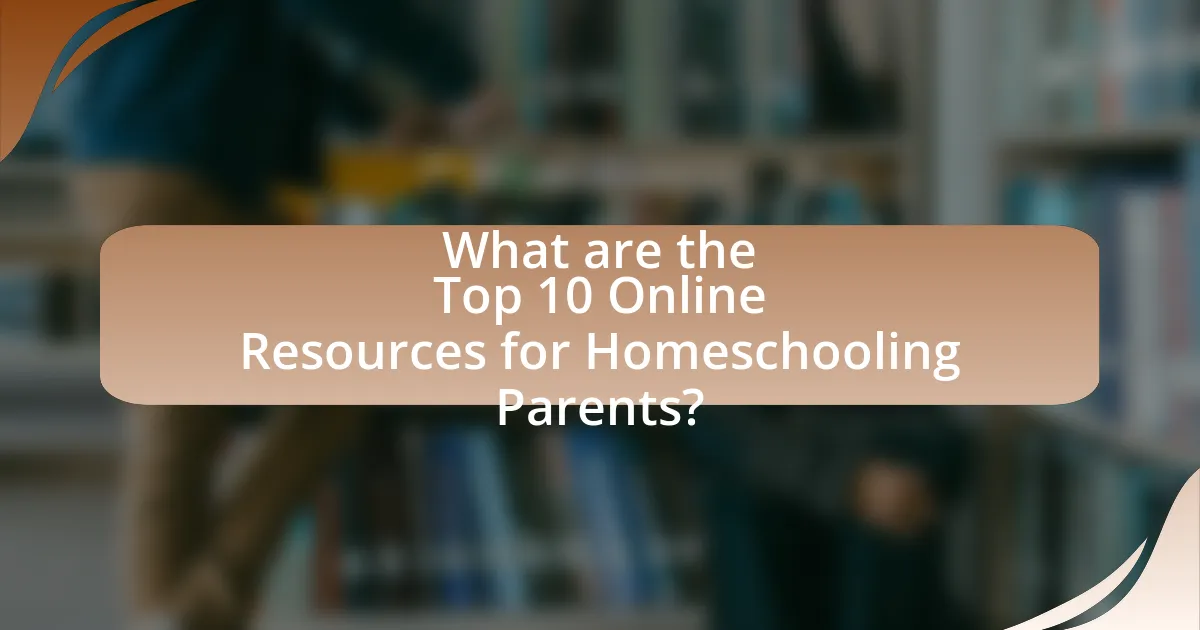
What are the Top 10 Online Resources for Homeschooling Parents?
The top 10 online resources for homeschooling parents are:
- Khan Academy – Offers free online courses, lessons, and practice in various subjects.
- Coursera – Provides access to courses from universities and organizations worldwide.
- Homeschool Legal Defense Association (HSLDA) – Offers legal support and resources for homeschooling families.
- National Home Education Research Institute (NHERI) – Provides research and statistics on homeschooling.
- Time4Learning – An online curriculum for preschool through high school that includes interactive lessons.
- Education.com – Offers worksheets, lesson plans, and educational games for various grade levels.
- PBS LearningMedia – Provides free educational resources and videos for teachers and students.
- Outschool – Connects students with live online classes taught by independent teachers.
- Teach Your Monster to Read – A free game that helps children learn to read through interactive activities.
- The Homeschool Mom – A comprehensive resource for homeschooling families, including curriculum reviews and support.
These resources are widely recognized for their educational value and support for homeschooling parents, making them effective tools for enhancing the homeschooling experience.
Which resources are best for core subjects like math and science?
Khan Academy and Coursera are among the best resources for core subjects like math and science. Khan Academy offers comprehensive lessons and practice exercises in mathematics and various science disciplines, catering to different grade levels and learning paces. Coursera provides access to courses from top universities, covering advanced topics in math and science, often including interactive elements and assessments. Both platforms are widely recognized for their educational quality, with Khan Academy reporting over 100 million users and Coursera partnering with institutions like Stanford and Yale, ensuring a robust learning experience.
What specific features make these resources effective for teaching math?
Effective resources for teaching math incorporate interactive elements, personalized learning paths, and real-world applications. Interactive elements, such as games and simulations, engage students and enhance understanding by allowing them to visualize concepts. Personalized learning paths adapt to individual student needs, ensuring that learners progress at their own pace, which has been shown to improve retention and mastery of mathematical concepts. Real-world applications connect math to everyday life, making the subject more relevant and motivating for students. These features collectively contribute to a more engaging and effective learning experience in mathematics.
How do science resources enhance hands-on learning experiences?
Science resources enhance hands-on learning experiences by providing interactive materials and tools that facilitate experiential learning. These resources, such as virtual labs, simulations, and DIY experiment kits, allow students to engage directly with scientific concepts, fostering deeper understanding and retention. For instance, studies have shown that hands-on activities can improve student performance in science subjects by up to 30%, as they encourage critical thinking and problem-solving skills. Additionally, resources like online platforms offer guided experiments that align with curriculum standards, ensuring that students not only learn theoretical knowledge but also apply it practically, which is essential for mastering scientific principles.
Which resources are ideal for language arts and social studies?
Ideal resources for language arts and social studies include online platforms such as Khan Academy, which offers comprehensive lessons and exercises in both subjects, and ReadWorks, which provides reading comprehension materials aligned with various grade levels. Additionally, PBS LearningMedia offers a wealth of multimedia resources specifically designed for social studies, while Grammarly aids in enhancing writing skills for language arts. These platforms are widely recognized for their educational quality and effectiveness, making them suitable for homeschooling parents seeking to enrich their curriculum.
What tools do these resources offer for improving reading and writing skills?
These resources offer tools such as interactive reading programs, writing prompts, grammar checkers, and vocabulary builders to enhance reading and writing skills. For instance, platforms like ABCmouse provide structured reading lessons that adapt to a child’s learning pace, while websites like Grammarly assist in improving writing by offering real-time feedback on grammar and style. Additionally, resources like ReadTheory offer comprehension exercises that help develop critical reading skills through personalized quizzes. These tools are designed to engage students actively, making the learning process effective and enjoyable.
How can social studies resources promote critical thinking and discussion?
Social studies resources promote critical thinking and discussion by providing diverse perspectives on historical events, social issues, and cultural contexts. These resources, such as primary source documents, case studies, and interactive simulations, encourage students to analyze information, evaluate different viewpoints, and engage in debates. For instance, using primary sources like letters or speeches allows students to interpret the motivations and consequences of historical actions, fostering deeper understanding and critical analysis. Research indicates that students exposed to varied social studies materials demonstrate improved analytical skills and greater engagement in discussions, as they learn to construct arguments and defend their viewpoints based on evidence.
What online platforms provide comprehensive homeschooling support?
Online platforms that provide comprehensive homeschooling support include Khan Academy, which offers free educational resources across various subjects; Time4Learning, a subscription-based service that provides a complete curriculum for pre-K through 12th grade; and Homeschool.com, which serves as a resource hub with articles, reviews, and a community for homeschooling families. These platforms are recognized for their extensive materials, structured courses, and supportive communities, making them valuable resources for homeschooling parents.
How do these platforms facilitate community and collaboration among homeschooling families?
These platforms facilitate community and collaboration among homeschooling families by providing dedicated spaces for interaction, resource sharing, and support. For instance, many platforms feature forums and discussion groups where parents can exchange ideas, ask questions, and share experiences, fostering a sense of belonging. Additionally, they often offer collaborative tools such as shared calendars and project management features that enable families to organize group activities and co-op classes. Research indicates that social support networks significantly enhance the homeschooling experience, as families who engage with others report higher satisfaction and improved educational outcomes.
What additional services do these platforms offer beyond educational content?
These platforms offer additional services such as community forums, personalized learning plans, and access to tutoring or mentoring. Community forums allow parents and students to connect with others for support and resource sharing, enhancing the homeschooling experience. Personalized learning plans cater to individual student needs, helping to tailor educational content effectively. Access to tutoring or mentoring provides additional academic support, ensuring students receive guidance in challenging subjects. These services complement the educational content, creating a more comprehensive homeschooling environment.

How can parents maximize the benefits of online resources for homeschooling?
Parents can maximize the benefits of online resources for homeschooling by strategically selecting high-quality educational platforms and integrating them into a structured learning plan. Research indicates that using diverse online resources, such as interactive courses, educational videos, and virtual tutoring, can enhance student engagement and understanding. For instance, a study published in the “Journal of Educational Psychology” found that students who utilized interactive online tools showed a 30% improvement in retention rates compared to traditional methods. Additionally, parents should regularly assess their child’s progress and adapt the resources to meet individual learning needs, ensuring that the online materials align with educational goals and standards.
What tips can help parents choose the right resources for their children?
Parents can choose the right resources for their children by evaluating the educational content, ensuring it aligns with their child’s learning style and needs. Assessing the credibility of the resource is crucial; reputable sources often provide evidence-based information and are created by qualified educators or institutions. Additionally, parents should consider the age appropriateness and engagement level of the materials, as resources that captivate a child’s interest can enhance learning outcomes. Research indicates that children learn better when they are actively engaged, making interactive resources particularly effective. Lastly, seeking recommendations from other homeschooling parents or educational forums can provide valuable insights into effective resources.
How can parents tailor resources to fit their child’s unique learning needs?
Parents can tailor resources to fit their child’s unique learning needs by assessing their child’s learning style, strengths, and areas for improvement. By identifying whether their child is a visual, auditory, or kinesthetic learner, parents can select online resources that align with these preferences, such as interactive videos for visual learners or audiobooks for auditory learners. Additionally, utilizing adaptive learning platforms that adjust content based on the child’s performance can provide personalized learning experiences. Research indicates that personalized learning approaches can significantly enhance student engagement and achievement, as evidenced by studies showing that tailored educational interventions lead to improved academic outcomes.
What are some best practices for using online resources effectively?
To use online resources effectively, prioritize credible sources, utilize search engines efficiently, and organize information systematically. Credible sources, such as educational institutions and peer-reviewed journals, ensure the reliability of the information accessed. Efficient use of search engines involves using specific keywords and advanced search techniques to narrow down results, which enhances the relevance of the information retrieved. Organizing information through tools like bookmarks, note-taking apps, or digital folders facilitates easy access and retrieval, improving overall learning efficiency. These practices are supported by research indicating that structured information retrieval and critical evaluation of sources significantly enhance learning outcomes.
What are common pitfalls to avoid when using online resources?
Common pitfalls to avoid when using online resources include relying on unverified information, neglecting to evaluate the credibility of sources, and failing to cross-reference facts. Unverified information can lead to the dissemination of false or misleading content, which is particularly detrimental in educational contexts. Evaluating the credibility of sources is crucial; for instance, peer-reviewed articles and reputable educational websites typically provide more reliable information than personal blogs or unregulated forums. Additionally, cross-referencing facts with multiple sources helps ensure accuracy and comprehensiveness, reducing the risk of misinformation.
How can parents ensure they are not overwhelmed by too many resources?
Parents can ensure they are not overwhelmed by too many resources by prioritizing quality over quantity and setting clear educational goals. By selecting a limited number of high-quality resources that align with their child’s learning objectives, parents can focus their efforts effectively. Research indicates that using fewer, well-chosen resources can lead to better educational outcomes, as it allows for deeper engagement with the material. Additionally, establishing a routine for resource evaluation and regularly assessing their child’s progress can help parents determine which resources are most beneficial, thereby reducing the feeling of being overwhelmed.
What strategies can help maintain a balanced approach to online learning?
To maintain a balanced approach to online learning, implementing structured schedules and setting clear boundaries is essential. Establishing a daily routine helps students allocate specific times for learning, breaks, and leisure activities, which can enhance focus and productivity. Research indicates that students who follow a structured schedule report higher levels of engagement and lower stress levels (American Psychological Association, 2020). Additionally, creating a dedicated learning space minimizes distractions and fosters a conducive environment for studying. Regularly assessing progress and adjusting learning strategies based on individual needs further supports a balanced approach, ensuring that students remain motivated and effectively manage their time.
What final advice can help parents succeed in homeschooling with online resources?
To succeed in homeschooling with online resources, parents should establish a structured routine that incorporates consistent learning schedules and breaks. This approach helps maintain focus and discipline, which are crucial for effective learning. Research indicates that students perform better academically when they have a consistent daily routine, as it fosters a sense of stability and predictability (American Psychological Association). Additionally, parents should leverage diverse online platforms that cater to various learning styles, ensuring that educational content remains engaging and accessible. By utilizing resources like interactive lessons, educational games, and virtual field trips, parents can enhance the learning experience and cater to their child’s unique needs.

